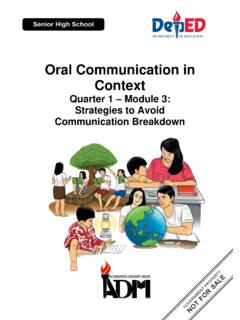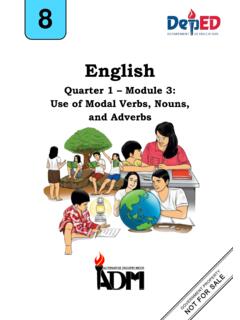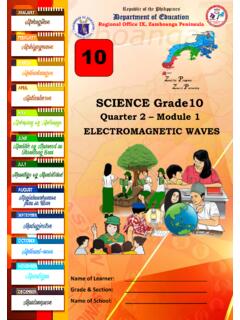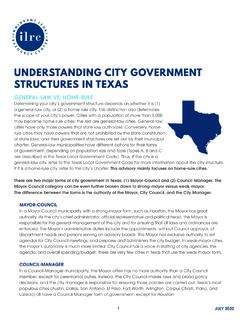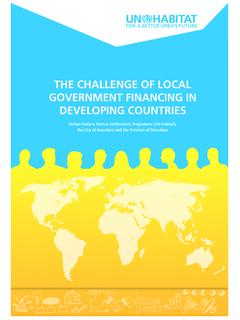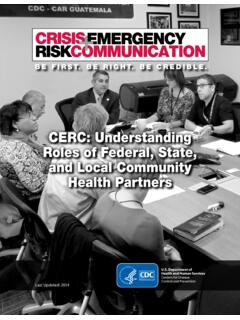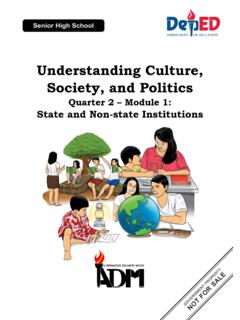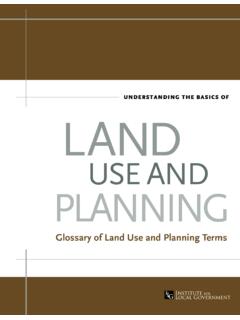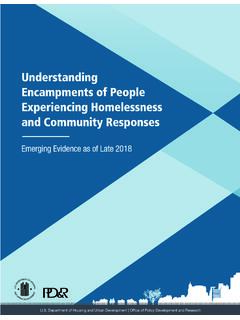Transcription of Module 1: Starting Points in Understanding Culture ...
1 Understanding Culture , society and politics Grade 11. Alternative Delivery Mode Module 1: Starting Points in Understanding Culture , society and politics First Edition, 2020. Republic Act 8293, section 176 states that: No copyright shall subsist in any work of the government of the Philippines. However, prior approval of the government agency or office wherein the work is created shall be necessary to exploitation of such work for profit. Such agency or office may, among other things, impose as a condition the payment of royalties. Borrowed materials ( , songs, stories, poems, pictures, photos, brand names, trademarks, etc.) included in this book are owned by their respective copyright holders. Every effort has been exerted to locate and seek permission to use these materials from their respective copyright owners. The publisher and authors do not represent nor claim ownership over them. Published by the Department of Education Secretary: Leonor M.
2 Briones Undersecretary: _____. Assistant Secretary: _____. Development Team of the Module : Author: Candida Evaluator: Development Team Swannie of the Maria Module Sofia S. Gacus Illustrator: Jay Michael A. Calipusan Management Author: Team: Candida Chairperson: Dr. Arturo B. Bayocot, CESO III. Evaluator: Swannie Maria Sofia S. Gacus Regional Director Co-Chairpersons: Dr. Victor G. De Gracia Jr., CESO V. Illustrator: Asst. Regional Director Mala Epra B. Magnaong Layout Artist: CES, CLMD. Members: Dr. Bienvenido U. Tagolimot, Jr. Management Team: Regional ADM Coordinator Ray Butch M. Mahinay EPS-Designate- AP. Printed in the Philippines by _____. Department of Education Bureau of Learning Resources (DepEd-BLR). Office Address: Zone 1, Upper Balulang, Cagayan de Oro City 9000. Printed Telefax: in the Philippines by: Department (088) 880-7071, of Education Regional Office 10. (088) 880-7072. Office Address: Zone 1, Upper Balulang Cagayan de Oro City 9000.
3 Email Address: Telefax: (088) 880-7071, (088) 880-7072. E-mail Address: ii UNDERTANDING Culture , society AND politics . Quarter 1- Module 1. Starting Points in Understanding Culture , society and politics This instructional material was collaboratively developed and reviewed by educators from public and private schools, colleges and or/universities. We encourage teachers and other education stakeholders to email their feedback, comments, and recommendations to the Department of Education at We value your feedback and recommendations. Department of Education Republic of the Philippines iii Table of Contents Module1- Starting Points in Understanding Culture , society and 1. politics Overview 1. Module Contents 1. Objectives 1. General Instructions 2. Pre Test 2. Lesson 1- Knowing about human cultural and social variations 5. Lesson concept 5. Activity 6. Activity 8. Enrichment activity 9. Activity 10. Activity 11.
4 Lesson 2- Observations about social, political and cultural 12. change and cultural behavior Lesson concept 12. Activity 13. Lesson 3- Definition and Goals Anthropology, Sociology 15. and politics Activity 16. Lesson concept 16. Activity 17. Post Assessment 22. Key Answer 24. Reference 23. iv Module 1. Starting Points in Understanding Culture , society and politics This Module helps you become aware of your role, and how you are going to function in accordance with the Culture of your society leading towards nation building, and to respect human cultural variation in your community, country, and the whole world. However, to have dynamic society , politics is also needed, for this affects the life of every individual on how you are going to behave as member of the group, so with your relationship to other people What I need to know in this Module ? This Module has the following lessons: Lesson 1 Knowing about human cultural and social variations Lesson 2 Observations about social, political and cultural change and cultural behavior Lesson3 Definition and Goals Anthropology, Sociology and Political Science What do I need to learn?
5 After you go through on this Module , you are expected to: 1. Describe human cultural variation in terms of their physical features, social differences, political and social change. 2. Analyze the significance of Culture and society and the perception of politics 3. Identify the evident of social, political and cultural change 4. Differentiate the terms of anthropology, sociology and political science 5. Compare the goals anthropology, sociology, and political science 1. For you to attain the goals of this Module , please do the following;. a. Take time to read and understand the lessons b. Follow the instruction in each given task c. Answers all tests and activities diligently d. Familiarize yourselves with the terms given Pre - Test Multiple Choice: Write the letter of the correct answer before each number. means a complex whole that includes habits and capabilities acquired by man in the society . a.
6 politics c. Culture b. Sociology d. society _____2. It is the perception of individuals to accepted reality a. Knowledge c. Outlook b. Beliefs d. Folkways consists of tangible things such as technological tools, architectural, structures, fashion and accessories and food. a. Material Culture c. Non-material Culture b. Basic Culture d. Commercial Culture are different types of human groups in the world like Malaysians, Indonesians and others. In what human group you belong? a. Chinese c. Filipinos b. Japanese d. Arabs means a transformation of a group, organization, community from simple to more complex one. a. Social change c. Social differences b. Diffusion d. Modernity changes in society due to its forces and traditions in society is called;. a. Political c. Cultural b. Social d. Human 2. refers to the scientific study of man, his works, his behavior and values;. a. Anthropology c. Sociology b. Political Science d.
7 Psychology ____8. Which of the following is more important in studying Culture : a. Public affair c. Human adaptation b. Collective activity d. Economic progress _____9. One of the goals of sociology is to help us understand the changes in;. a. Environment c. Education system b. politics Issues d. Societal problem change in society that is related to political ideologies, government and citizenships is part of;. a. Social change c. political change b. Cultural change d. human change refers to the social, cultural and psychological characteristics related to males and females based on certain social context. a. Gender c. Culture b. society d. politics _____12. The main subject of this discipline is government like democracy, power and authority;. a. Sociology c. Anthropology b. Political Science d. Economics means a group of people who have common shared Culture , language, history, religion, and tradition.
8 A. Variation c. Acculturation b. Ethnicity d. Stratification of the following religion believed in Allah? a. Christians c. Protestants b. Islam d. Buddhists is a systematic study of state and government its relationships to men In the community, it emphasizes the use of power, influence, interest which is In a well - ordered community. a. Anthropology c. Sociology b. Earth Science d. Political Science 3. ____16. A scientific study of patterned, shared human behavior that analysis human Interaction which is essential in Understanding man's cultural make-up. a. Sociology c. Biology b. Psychology d. Philosophy ____17. A person's instinctive membership in any nation or country is called;. a. Citizenships b. Organization b. Nationality d. Ethnocentrism transformation of social institutions over time is called;. a. Migration c. Globalization b. Cultural change d. Social change _____19. This is a process in the cultural traits of one society are borrowed, transmitted and adopted by other society .
9 A. Transfusion c. Immigration c. Adaptation d. Diffusion _____20. Which of the following is the goal of studying Anthropology? a. describe and analyze the biological evolution of mankind b. appreciate complexity c. be immersed in current affairs d. cultural diversity 4. Lesson 1. Knowing about Human Cultural and Social Variations Content Standard Human cultural variation, social differences, social change, political change and political identities Learning Articulate observations on human cultural variations Competency social differences, social change and political identities CODE (UCSP 11/12 SPU-Ia-1). Learning Explain the meaning of the following: Objectives a. Cultural variation b. Social differences c. Political change and d. Political identities What is this lesson? To start learning the lessons, you have to read and understand some important words, A. Culture refers to that complex whole which include knowledge, beliefs, arts, morals, laws, customs, and any other capabilities and habits acquired by man as member of a society .
10 (Edward H. Taylor). Two types of Culture : 1. Material Culture - composed of tangible things like food, tools, dress, accessories and others. 2 .Non-material Culture composed of intangible things such as habits, ideas, religion, language and behavior Cultural Variation refers to the differences in social behaviors that cultures exhibit around the world. In the Philippines differences in social behaviors are influence with cultures in a specific places and tribes. So with the different 5. people in different countries they have also different norms and values that exists within their groups Example of Cultural Variation in Dress Styles Indonesia Philippines Thailand Examples of Cultural Variation in Dances Philippines Malaysians 6. What's New? Activity We are Culturally Varied Directions: Describe the human groups below and fill in the columns below for your answer. Filipina Indian Chinese Africans Human Group Physical Features Filipino Indian Chinese Africans Americans 7.

